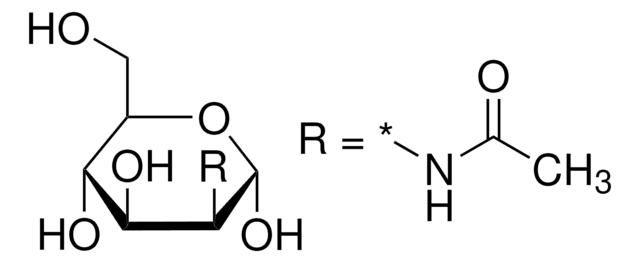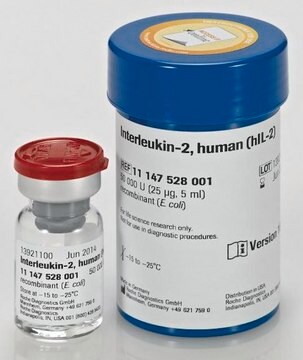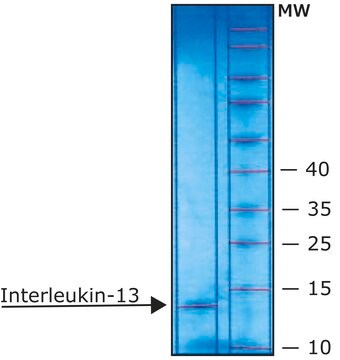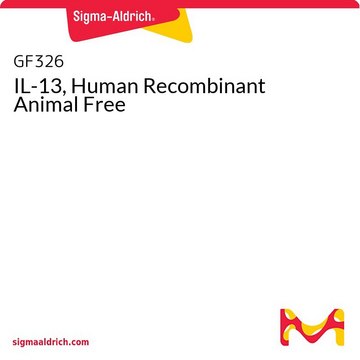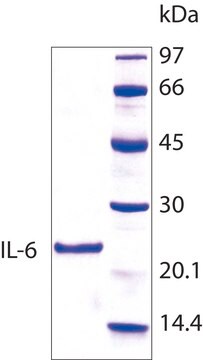SRP3095
IL-5 human
recombinant, expressed in E. coli, ≥98% (SDS-PAGE), ≥98% (HPLC), suitable for cell culture
Synonym(s):
BCDFII, EDF
Sign Into View Organizational & Contract Pricing
All Photos(1)
About This Item
UNSPSC Code:
12352202
NACRES:
NA.32
Recommended Products
biological source
human
recombinant
expressed in E. coli
Assay
≥98% (HPLC)
≥98% (SDS-PAGE)
form
lyophilized
potency
≤0.25 ng/mL ED50
mol wt
26.0 kDa
packaging
pkg of 10 μg
technique(s)
cell culture | mammalian: suitable
impurities
<0.1 EU/μg endotoxin, tested
color
off-white to yellow
UniProt accession no.
shipped in
wet ice
storage temp.
−20°C
Gene Information
human ... IL5(3567)
General description
IL-5 is a hematopoietic growth factor that stimulates the proliferation and activation of eosinophils. Produced by mast cells, T cells, and eosinophils, IL-5 plays an important role in inducing cell-mediated immunity against parasitic infections and certain tumors. Elevated levels of IL-5 lead to Eosinophilia, which may result in the induction of asthma and other allergic diseases. Human and murine IL-5 is cross-species reactive. Recombinant human IL-5 is a 26.0 kDa disulfide-linked homodimeric protein containing two 116 amino acid chains.
Biochem/physiol Actions
IL-5 is a hematopoietic growth factor that stimulates the proliferation and activation of eosinophils. Recombinant human IL-5 is a 26.0 kDa disulfide-linked homodimeric protein containing two 116 amino acid chains.
Sequence
MIPTEIPTSA LVKETLALLS THRTLLIANE TLRIPVPVHK NHQLCTEEIF QGIGTLESQT VQGGTVERLF KNLSLIKKYI DGQKKKCGEE RRRVNQFLDY LQEFLGVMNT EWIIES
Physical form
Lyophilized from a sterile (0.2 micron) filtered aqueous solution containing 10 mM sodium glycinate, pH 8.5
Reconstitution
Centrifuge the vial prior to opening. Reconstitute in water to a concentration of 0.1-1.0 mg/ml. Do not vortex. This solution can be stored at 2-8°C for up to 1 week. For extended storage, it is recommended to further dilute in a buffer containing a carrier protein (example 0.1% BSA) and store in working aliquots at -20°C to -80°C.
Storage Class Code
11 - Combustible Solids
WGK
WGK 3
Flash Point(F)
Not applicable
Flash Point(C)
Not applicable
Choose from one of the most recent versions:
Certificates of Analysis (COA)
Lot/Batch Number
Don't see the Right Version?
If you require a particular version, you can look up a specific certificate by the Lot or Batch number.
Already Own This Product?
Find documentation for the products that you have recently purchased in the Document Library.
Interleukin-5, eosinophils, and disease.
C J Sanderson
Blood, 79(12), 3101-3109 (1992-06-15)
Takehito Kobayashi et al.
Allergology international : official journal of the Japanese Society of Allergology, 64 Suppl, S30-S36 (2015-09-08)
Eosinophils recognize various stimuli, such as cytokines, chemokines, immunoglobulins, complement, and external pathogens, resulting in their accumulation in mucosal tissues and the progression of inflammation. Eosinophils are also involved in innate Th2-type immune responses mediated through endogenous danger signals, including
H D Campbell et al.
Proceedings of the National Academy of Sciences of the United States of America, 84(19), 6629-6633 (1987-10-01)
The human eosinophil differentiation factor (EDF) gene was cloned from a genomic library in lambda phage EMBL3A by using a murine EDF cDNA clone as a probe. The DNA sequence of a 3.2-kilobase BamHI fragment spanning the gene was determined.
Ma Paz Zafra et al.
International journal of molecular sciences, 16(3), 5434-5451 (2015-03-13)
Eosinophils are one of the key inflammatory cells in asthma. Eosinophils can exert a wide variety of actions through expression and secretion of multiple molecules. Previously, we have demonstrated that eosinophils purified from peripheral blood from asthma patients express high
Our team of scientists has experience in all areas of research including Life Science, Material Science, Chemical Synthesis, Chromatography, Analytical and many others.
Contact Technical Service

